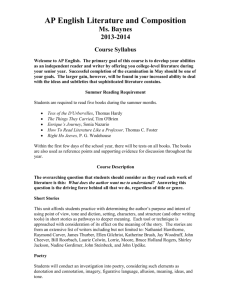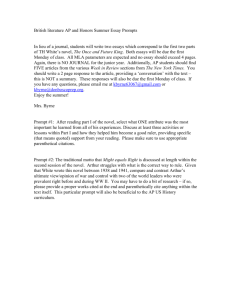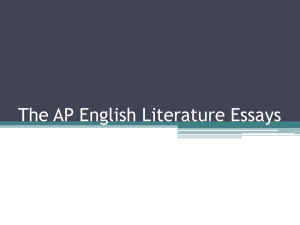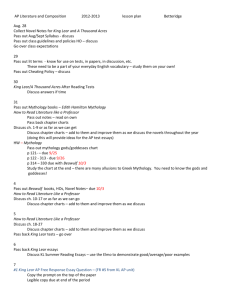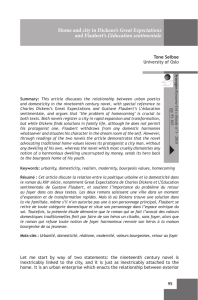AP English Literature & Composition Syllabus 2011-2012
advertisement
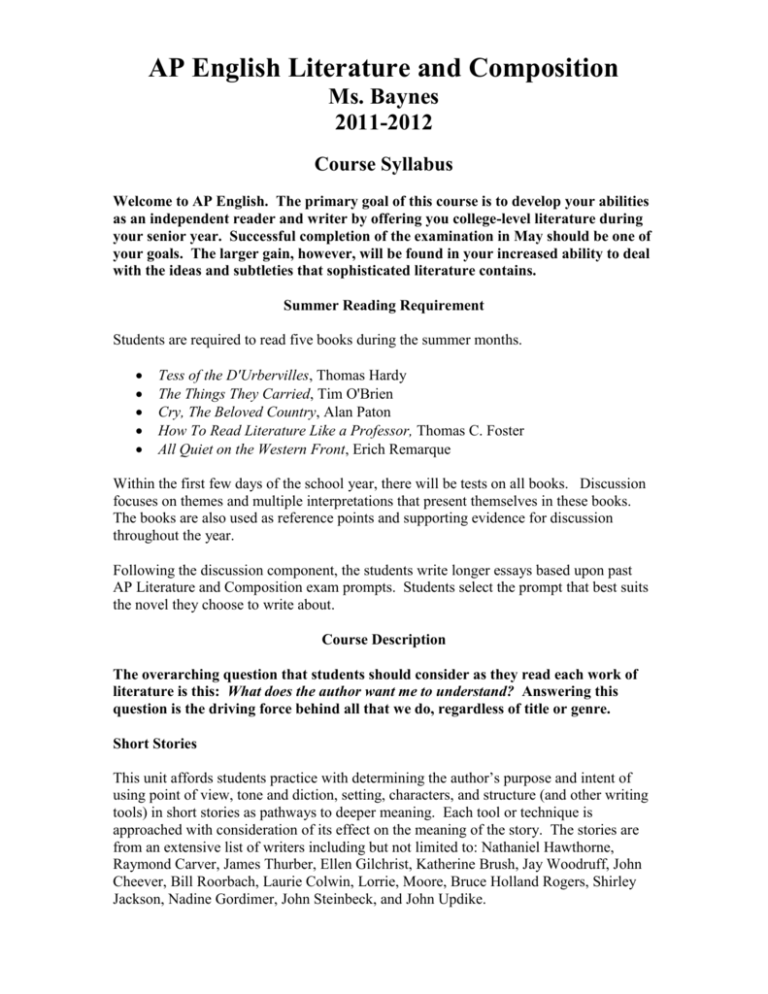
AP English Literature and Composition Ms. Baynes 2011-2012 Course Syllabus Welcome to AP English. The primary goal of this course is to develop your abilities as an independent reader and writer by offering you college-level literature during your senior year. Successful completion of the examination in May should be one of your goals. The larger gain, however, will be found in your increased ability to deal with the ideas and subtleties that sophisticated literature contains. Summer Reading Requirement Students are required to read five books during the summer months. Tess of the D'Urbervilles, Thomas Hardy The Things They Carried, Tim O'Brien Cry, The Beloved Country, Alan Paton How To Read Literature Like a Professor, Thomas C. Foster All Quiet on the Western Front, Erich Remarque Within the first few days of the school year, there will be tests on all books. Discussion focuses on themes and multiple interpretations that present themselves in these books. The books are also used as reference points and supporting evidence for discussion throughout the year. Following the discussion component, the students write longer essays based upon past AP Literature and Composition exam prompts. Students select the prompt that best suits the novel they choose to write about. Course Description The overarching question that students should consider as they read each work of literature is this: What does the author want me to understand? Answering this question is the driving force behind all that we do, regardless of title or genre. Short Stories This unit affords students practice with determining the author’s purpose and intent of using point of view, tone and diction, setting, characters, and structure (and other writing tools) in short stories as pathways to deeper meaning. Each tool or technique is approached with consideration of its effect on the meaning of the story. The stories are from an extensive list of writers including but not limited to: Nathaniel Hawthorne, Raymond Carver, James Thurber, Ellen Gilchrist, Katherine Brush, Jay Woodruff, John Cheever, Bill Roorbach, Laurie Colwin, Lorrie, Moore, Bruce Holland Rogers, Shirley Jackson, Nadine Gordimer, John Steinbeck, and John Updike. Poetry Students will conduct an investigation into poetry, considering such elements as denotation and connotation, imagery, figurative language, allusion, meaning, ideas, and tone. Novels and Plays Pride and Prejudice – Jane Austen This novel affords students the opportunity to engage in close study of language and of the author’s ironic voice. We will discuss Austen’s confined rural landscape and her revelation of aspects of the human condition. Essays of analysis on key passages will accompany the reading. The unit concludes with a formal essay based upon literary criticism of the work. A Tale of Two Cities – Charles Dickens The students read this novel as an example of social and political commentary and of satire. Dickens' use of point of view to elicit pathos from the reader and reveal the message will be the focus of discussion. The culminating paper will be on this technique and Dickens’ unique use of it. A Passage to India – E. M. Forster This novel explores the ramifications of British colonization of India. Central to the novel is the uncertainty that often characterizes human interaction, at the personal as well as at the cultural level. Students will compare the novel's realism and mysticism. The unit concludes with a formal essay that compares those two elements of the novel. Madame Bovary- Gustave Flaubert Students will consider whether Flaubert truly is the ultimate realist, as many critics categorize him, or whether he is more concerned with the act of writing. The precision of his writing as he develops complex yet flawed characters is discussed. The author’s tone and intent as the lesson of the story is revealed will be the focus of culminating papers. Hamlet – Shakespeare The goals of this unit are to practice close reading and to gain a full understanding of the language of the play. Paraphrasing is a regular activity. We may view different film versions of Hamlet. The students will choose thirty lines to recite in front of the class and perform a selected scene. Writing includes analysis of a soliloquy and a formal essay on the complexity of Hamlet’s character. Crime and Punishment – Fyodor Dostoevsky Students will analyze the morality of the plot and consider the usefulness of nihilism, utilitarianism, rationalism, and socialism in the context and setting of the novel and in the present day. A culminating project will be a modern day legal justification of the case. Waiting for Godot – Samuel Beckett This unit is an introduction to the Theater of the Absurd. We will try to make sense out of nonsense while considering our overarching question, What does the author want me to understand? Candide – Voltaire This is the anchor text for a satire unit that culminates with students' original written satires. The College Essay The students are required to write personal essays for their college applications as part of their school instruction. This project usually lasts one to two weeks. The Research Paper Students will write a critical analysis of four full-length novels or plays by the same writer. Students receive a list of possible writers from their teacher. The purpose of this assignment is to use a scholarly approach in order to analyze one of the following aspects of those works: Style Setting Tone Symbol Diction Irony Theme Context Character Society You must use at least four primary and at least two secondary sources in developing your paper. You must submit at least 50 notecards. You must give evidence of exhaustive research, covering a full range of criticism of your author and his or her works. Page length: 10-15 typed pages double-spaced, exclusive of the Works Cited page Margins: One-inch margins Font: 12-point font New Times Roman, blue or black ink Format: MLA (refer to Duxbury Research Guide) Students will begin their research independently at the beginning of the school year. Global Collaboration Students may be asked to engage in online collaboration with students from another country. The goal is to broaden horizons by learning about another culture and by considering differing perspectives on literature and life. Other AP test practice Unit tests Quizzes, both announced and unannounced Literature response journals Dialectic journals Expository essays Essays of analysis Any part of this syllabus is subject to change. Book selections depend upon availability.
